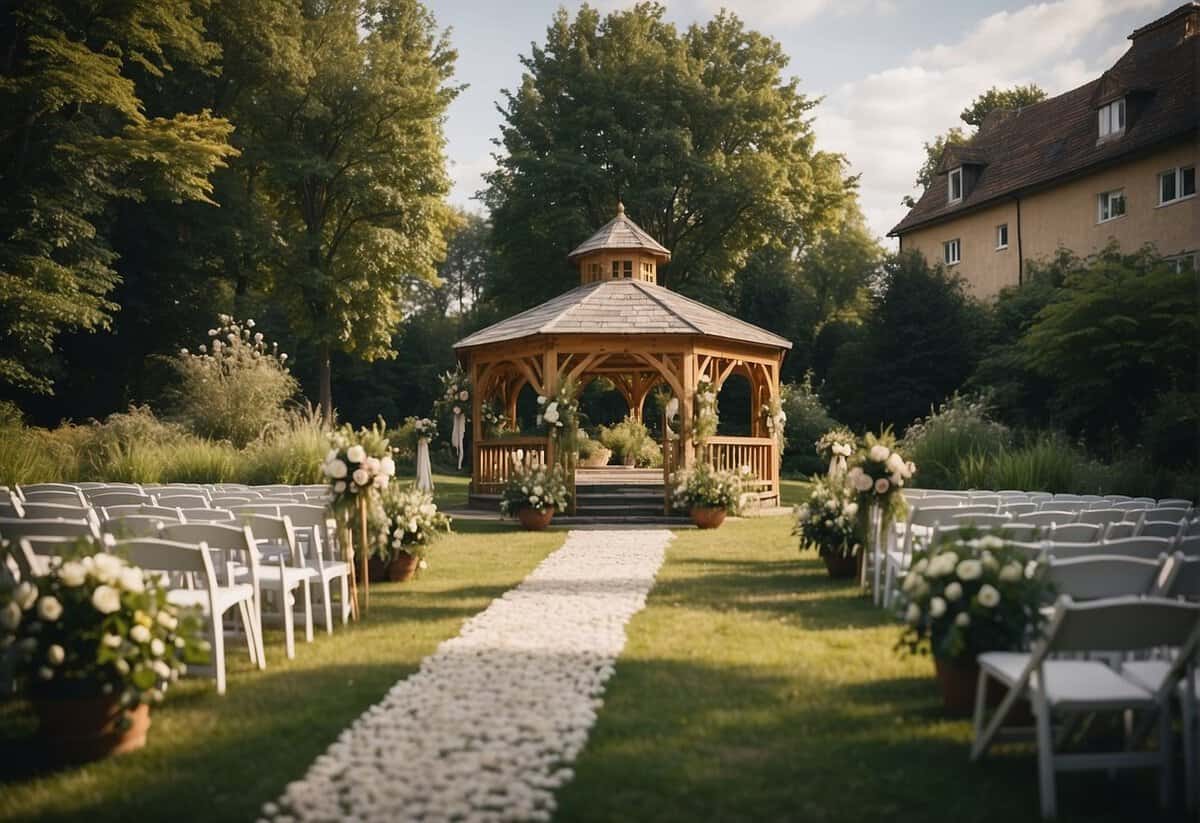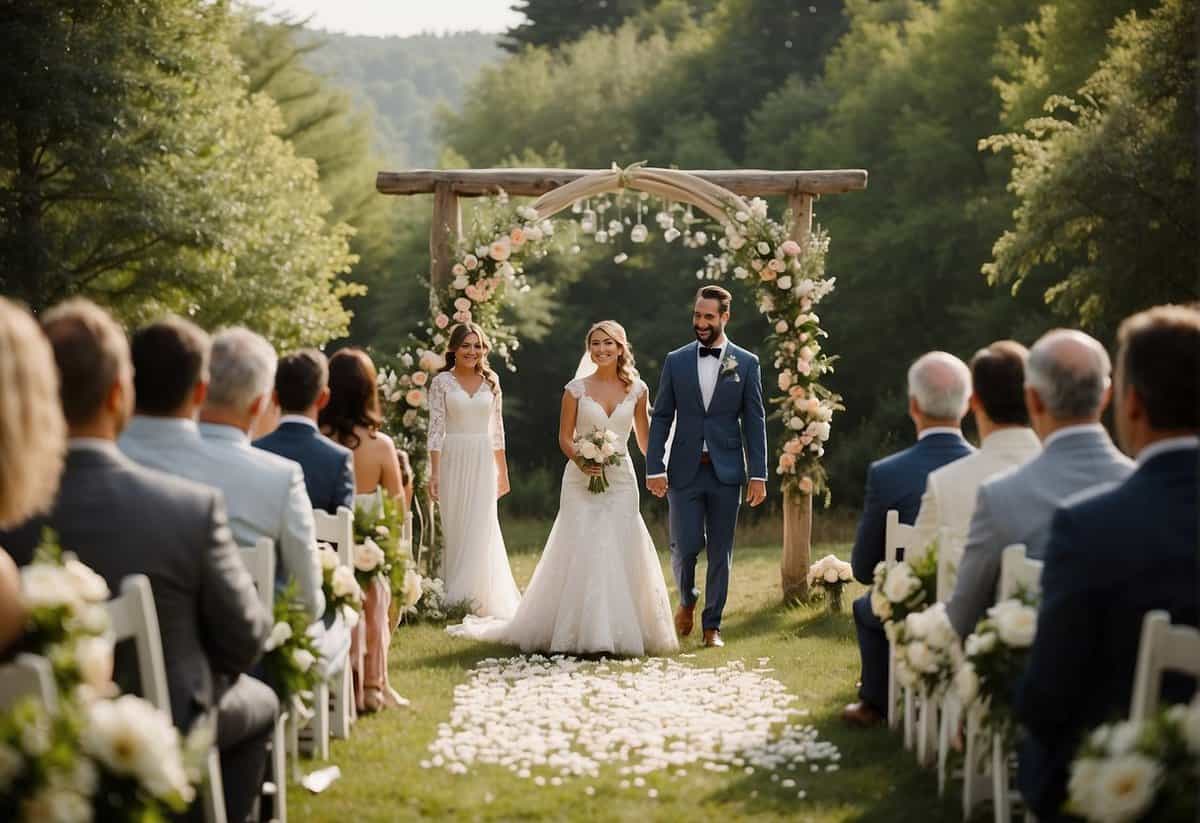Can You Get Married for Free in the UK? Unveiling No-Cost Nuptials
Getting married is one of life’s significant milestones, a testament to love and commitment. If you’re planning to tie the knot in the UK, you might wonder if it’s feasible to have a wedding that doesn’t break the bank. While there are various costs associated with getting married, from the ceremony to the reception, the idea of a wedding without a price tag might seem enticing.

In the UK, the legal act of getting married or entering into a civil partnership inherently involves certain costs, such as the notice of marriage fee and the charges for the marriage or civil partnership certificate. However, there are ways to minimize expenses, making the dream of an affordable wedding more attainable. It’s worth exploring how you can celebrate your union without incurring large costs, whether through a simple civil ceremony or by finding cost-effective alternatives for your special day.
Key Takeaways
- Understanding statutory costs involved with marriage is essential.
- There are strategies to minimize wedding expenses while still having a meaningful celebration.
- Creative venue selection and ceremony choices can influence the overall cost.
Legal Requirements for Marriage in the UK

When planning to tie the knot in the UK, you’ll need to be aware of the specific legal requirements that apply. From age restrictions to the necessary documentation, complying with these regulations is essential for your marriage to be legally recognized.
Age and Consent
In the UK, you must be at least 18 years old to marry without parental or guardian consent. If you’re in Scotland, you can marry at 16 without such consent. Your marriage is subject to certain consents if you’re 16 or 17 in England and Wales, requiring permission from parents or legal guardians.
Marital Status and Documents
You can’t get married if you’re already married or in a civil partnership; your current union must legally end first. For those who are divorced, a decree absolute is required, while widowed individuals must provide a death certificate of their former spouse. All official documents must be presented to proceed with the marriage process.
Religious and Civil Ceremonies
You have the option of a religious or civil ceremony. For a religious ceremony, places of worship like the Church of England or other religious building recognized for marriage ceremonies may be chosen. Civil marriages take place in a registry office or a venue approved for civil ceremonies, such as a hotel.
Registration Process and Notice Period
Before getting married, you must give notice at the local registration district in England and Wales at least 29 days before your wedding. This is your formal declaration of the intention to marry, and it includes providing details of where and when the marriage will take place. After giving notice, a marriage certificate is issued, which is a legal record of the marriage.
The Cost of Getting Married in the UK

Embarking on the journey of matrimony in the UK brings with it certain essential expenses. Understanding these costs, from statutory fees to potential additional charges, will help you budget for your special day effectively.
Statutory Fees and Additional Costs
Your marriage in the UK will come with some non-negotiable statutory fees. When you’re ready to give notice of marriage at your local register office, a standard fee applies. Currently, the cost is £35 per person, or £47 if either you or your partner are from outside the UK, EU, EEA, or Switzerland. After your nuptials, obtaining a marriage certificate will cost you an additional £11.
Apart from the notice fee, marrying in an approved venue may incur higher charges, and if you choose to marry in the Church of Wales, there will be separate fees to consider. Keep in mind that these are base costs and can increase if you require a more comprehensive service.
Ensure to have your proof of name, age, and nationality when attending your appointments, as these documents are crucial to proceed without delays or extra costs.
Reducing Expenses
To keep costs down, consider a straightforward ceremony at your local register office, which may be less expensive than an elaborate event at an approved venue. Concerning the mandatory presence of witnesses, asking friends or family members to fulfill this role can be a lovely way to involve them without extra expense.
It’s also possible to forego additional features like readings or music during the ceremony, which can bring down the overall cost. Remember, the marriage schedule, which is part of the legal documentation process, does not add to the overall expense as it’s a part of the statutory fee.
By prioritizing costs and opting for simpler arrangements, you can celebrate your union without excessive financial burden.
Options for Venues and Ceremonies

When considering your wedding in the UK, you have a variety of venues to choose from whether you prefer a traditional setting or something more unique. Let’s explore the types of locations where you can tie the knot.
Approved Venues
The UK offers a broad selection of approved venues for civil ceremonies. These range from hotels to stately homes, and even some more unusual options. Civil partnerships can also be solemnized in these venues. When choosing an approved venue, remember that each site is licensed by a local authority, ensuring that all your paperwork is legally binding. You may find the approved premises list helpful for a registry office or venue in your area.
Religious Buildings and Churches
If you seek a religious ceremony, churches and other religious buildings affiliated with your faith can host your wedding. Anglican weddings can take place in your local parish church, and you don’t need to provide separate legal paperwork as the church handles it. For a Quaker or Church in Wales marriage, different rules may apply, and it’s advisable to check with the institution directly. Remember, religious ceremonies at places of worship must be performed by a recognized official.
Non-Traditional Venues
For those looking at more non-traditional venues, there’s good news. In England and Wales, options have expanded, including the ability to hold outdoor civil weddings and partnerships. While there’s usually a cost associated with hiring non-traditional wedding venues, you may find some offer affordable packages or options for a more budget-friendly ceremony. Keep in mind that to legally marry in a non-traditional venue, the place must be approved for marriage by your local council.
Special Considerations for Marriage in the UK

When considering marriage in the UK, there are specific rules surrounding visas, types of ceremonies, and the status of individuals from abroad that you need to be aware of. Understanding these can help ensure your marriage is legal and recognized.
Marriages Involving Foreign Nationals
If you’re a foreign national and wish to get married in the UK, you must hold the correct entry visa. This could be a marriage visitor visa, family visa, or fiancé(e) visa. It’s essential to know that the process includes an application to give notice of marriage, and you may need to wait up to 70 days if you don’t have settled status, indefinite leave to remain, or pre-settled status under the EU Settlement Scheme. Always check if your visa allows you to marry or enter into a civil partnership in the UK.
Same-Sex Couples and Transgender Persons
In England and Wales, same-sex couples can either marry or enter into a civil partnership. For these couples and transgender persons with a Gender Recognition Certificate, the marriage process is largely similar to that of heterosexual couples. The key difference is the ability to convert a civil partnership into a civil marriage should you wish to change the nature of your relationship legally.
Cultural and Religious Considerations
Marriages in the UK must generally be conducted at an approved venue and by persons recognized to do so under UK law. This includes religious places like churches, where usually at least one partner needs to belong to the religious body in question—such as a Church of England service—or for a Jewish or Quaker ceremony, which has its own regulations. If you wish to marry abroad, it’s crucial to understand that foreign law will apply, and you should check if a UK marriage would be recognised there.
Frequently Asked Questions

Navigating the requirements and costs associated with getting married in the UK can seem complex, but these FAQs will guide you through some of the essentials you need to know.
How much does it generally cost to have a wedding at a registry office in the UK?
The cost of marrying at a registry office in the UK is not fixed and can vary, but you’ll generally need to pay a fee for giving notice and a fee for the actual ceremony. For example, giving notice might cost around £35, and the ceremony can range from £46 to £151, depending on the location and time.
What documents are required for international couples to marry in the United Kingdom?
International couples need to provide specific documents such as a valid passport, proof of residence, visa or entry clearance, and details of the final venue. In some cases, you might have to wait up to 70 days before getting married if you’re from outside the UK or Ireland and are referred to the Home Office.
What is the process for getting married in a UK registry office?
To marry in a UK registry office, you must first give notice at your local register office at least 29 days before your ceremony. Choice of venue and date must be booked in advance, and you’ll also need to decide on the type of ceremony you want.
Can a marriage conducted overseas be recognized in the UK without formal registration?
Generally, if your overseas marriage complies with the laws of the country where it took place, it is recognized in the UK. However, there are exceptions, especially regarding the age of the participants and prior marital status, so it might be necessary to validate the marriage within the UK.
What are some budget-friendly options for getting married in the United Kingdom?
For a budget-friendly wedding, consider having a weekday ceremony at a registry office or a smaller venue, which can be less costly. You can also reduce expenses by limiting the guest list and opting for a simple celebration.
How can I obtain a certificate of no impediment to marry (CNI) in the UK?
To obtain a CNI, you must give notice at your local registry office. After the notice period, provided there are no objections, the certificate can be issued. This generally takes around 29 days.

